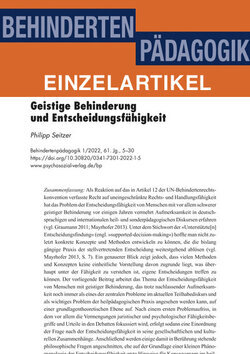26 Seiten, PDF-E-Book
Erschienen: März 2022
Bestell-Nr.: 23502
https://doi.org/10.30820/0341-7301-2022-1-5
abonnieren
Philipp Seitzer
Geistige Behinderung und Entscheidungsfähigkeit (PDF)
Sofortdownload
Dies ist ein E-Book. Unsere E-Books sind mit einem personalisierten Wasserzeichen versehen,
jedoch frei von weiteren technischen Schutzmaßnahmen (»DRM«).
Erfahren Sie hier mehr zu den Datei-Formaten.
Als Reaktion auf das in Artikel 12 der UN-Behindertenrechtskonvention verfasste Recht auf uneingeschränkte Rechtsund Handlungsfähigkeit hat das Problem der Entscheidungsfähigkeit von Menschen mit vor allem schwerer geistiger Behinderung vor einigen Jahren vermehrt Aufmerksamkeit in deutschsprachigen und internationalen heilund sonderpädagogischen Diskursen erfahren (vgl. Graumann 2011; Mayrhofer 2013). Unter dem Stichwort der »Unterstützte[n] Entscheidungsfindung« (engl. »supported-decision-making«) hoffte man nicht zuletzt konkrete Konzepte und Methoden entwickeln zu können, die die bislang gängige Praxis der stellvertretenden Entscheidung weitestgehend ablösen (vgl. Mayrhofer 2013, S. 7). Ein genauerer Blick zeigt jedoch, dass vielen Methoden und Konzepten keine einheitliche Vorstellung davon zugrunde liegt, was überhaupt unter der Fähigkeit zu verstehen ist, eigene Entscheidungen treffen zu können. Der vorliegende Beitrag arbeitet das Thema der Entscheidungsfähigkeit von Menschen mit geistiger Behinderung, das trotz nachlassender Aufmerksamkeit noch immer als eines der zentralen Probleme im aktuellen Teilhabediskurs und als wichtiges Problem der heilpädagogischen Praxis angesehen werden kann, auf einer grundlagentheoretischen Ebene auf. Nach einem ersten Problemaufriss, in dem vor allem die Vermengungen juristischer und psychologischer Fähigkeitsbegriffe und Urteile in den Debatten fokussiert wird, erfolgt sodann eine Einordnung der Frage nach der Entscheidungsfähigkeit in seine gesellschaftlichen und kulturellen Zusammenhänge. Anschließend werden einige damit in Berührung stehende philosophische Fragen angeschnitten, ehe auf der Grundlage einer kleinen Phänomenologie der Entscheidungsfähigkeit erste Hinweise für Konsequenzen im heilund sonderpädagogischen Umgang mit diesem Problem gesucht werden.
Abstract:
As a reaction to the right to unrestricted legal capacity and capacity to act, as laid down in Article 12 of the UN-Convention on the Rights of Persons with Disabilities, the problem of the decision-making capacity of people with severe intellectual disabilities in particular received increased attention in German-language and international special education discourses a few years ago (cf. Graumann 2011, Mayrhofer 2013). Under the heading of »supported-decision-making«, it was hoped that concrete concepts and methods could be developed that would largely replace the previously common practice of proxy decision-making (cf. Mayrhofer, 7). However, a closer look shows that many methods and concepts are not based on a uniform idea of what is to be understood by the ability to make one’s own decisions. This article works through the issue of decision-making ability of people with intellectual disabilities, which despite decreasing attention can still be seen as one of the central problems in the current discourse on participation and as an important problem in special education practice, on a basic theoretical level. After an initial outline of the problem, focusing primarily on the conflations of legal and psychological concepts of ability and judgments in the debates, the question of decision-making ability is then placed in its social and cultural contexts. Subsequently, some related philosophical questions are touched upon before, on the basis of a short introduction into a phenomenological approach to decision-making ability, first indications for consequences in dealing with this problem in special education are sought.
Abstract:
As a reaction to the right to unrestricted legal capacity and capacity to act, as laid down in Article 12 of the UN-Convention on the Rights of Persons with Disabilities, the problem of the decision-making capacity of people with severe intellectual disabilities in particular received increased attention in German-language and international special education discourses a few years ago (cf. Graumann 2011, Mayrhofer 2013). Under the heading of »supported-decision-making«, it was hoped that concrete concepts and methods could be developed that would largely replace the previously common practice of proxy decision-making (cf. Mayrhofer, 7). However, a closer look shows that many methods and concepts are not based on a uniform idea of what is to be understood by the ability to make one’s own decisions. This article works through the issue of decision-making ability of people with intellectual disabilities, which despite decreasing attention can still be seen as one of the central problems in the current discourse on participation and as an important problem in special education practice, on a basic theoretical level. After an initial outline of the problem, focusing primarily on the conflations of legal and psychological concepts of ability and judgments in the debates, the question of decision-making ability is then placed in its social and cultural contexts. Subsequently, some related philosophical questions are touched upon before, on the basis of a short introduction into a phenomenological approach to decision-making ability, first indications for consequences in dealing with this problem in special education are sought.
Erik WeberS. 3–4Editorial (PDF)
Philipp SeitzerS. 5–30Geistige Behinderung und Entscheidungsfähigkeit (PDF)
Maria SchröderS. 31–55Selbststigmatisierung bei Menschen mit einer Diagnose aus dem schizophrenen Formenkreis (PDF)
Ergebnisse einer empirischen Untersuchung narrativer InterviewsLea ThönnesS. 57–73Partizipative Forschung digital und vielfältig (PDF)
Erprobung eines neuen FormatsOle LandsbergS. 75–80Rezension von: Heinz Becker (2020): Die große Welt und die kleine Paula (PDF)
Ludger Kowal-SummekS. 81–84Rezension von: Spyridon-Georgios Soulis & Lucia Kessler-Kakoulidis (2020): Inklusive Kulturschöpfung (PDF)
Stefan KlingsS. 85Behindertenpädagogik in Hessen (PDF)
Schwerpunktthema: Ausund Weiterbildung und Professionalisierung für inklusiven UnterrichtCarolin ApfelS. 87–98Politische Bildung an Förderschulen mit dem Förderschwerpunkt geistige Entwicklung (PDF)
Ergebnisse einer explorativen qualitativen Studie an hessischen Förderschulen mit dem Förderschwerpunkt geistige EntwicklungKarl Ludwig Rabe & Nils Euker S. 99–110Aus der Verbandsarbeit (PDF)
Philipp SeitzerS. 5–30Geistige Behinderung und Entscheidungsfähigkeit (PDF)
Maria SchröderS. 31–55Selbststigmatisierung bei Menschen mit einer Diagnose aus dem schizophrenen Formenkreis (PDF)
Ergebnisse einer empirischen Untersuchung narrativer InterviewsLea ThönnesS. 57–73Partizipative Forschung digital und vielfältig (PDF)
Erprobung eines neuen FormatsOle LandsbergS. 75–80Rezension von: Heinz Becker (2020): Die große Welt und die kleine Paula (PDF)
Ludger Kowal-SummekS. 81–84Rezension von: Spyridon-Georgios Soulis & Lucia Kessler-Kakoulidis (2020): Inklusive Kulturschöpfung (PDF)
Stefan KlingsS. 85Behindertenpädagogik in Hessen (PDF)
Schwerpunktthema: Ausund Weiterbildung und Professionalisierung für inklusiven UnterrichtCarolin ApfelS. 87–98Politische Bildung an Förderschulen mit dem Förderschwerpunkt geistige Entwicklung (PDF)
Ergebnisse einer explorativen qualitativen Studie an hessischen Förderschulen mit dem Förderschwerpunkt geistige EntwicklungKarl Ludwig Rabe & Nils Euker S. 99–110Aus der Verbandsarbeit (PDF)

